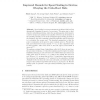Free Online Productivity Tools
i2Speak
i2Symbol
i2OCR
iTex2Img
iWeb2Print
iWeb2Shot
i2Type
iPdf2Split
iPdf2Merge
i2Bopomofo
i2Arabic
i2Style
i2Image
i2PDF
iLatex2Rtf
Sci2ools
ICALP
2009
Springer
2009
Springer
Improved Bounds for Speed Scaling in Devices Obeying the Cube-Root Rule
Speed scaling is a power management technique that involves dynamically changing the speed of a processor. This gives rise to dualobjective scheduling problems, where the operating system both wants to conserve energy and optimize some Quality of Service (QoS) measure of the resulting schedule. In the most investigated speed scaling problem in the literature, the QoS constraint is deadline feasibility, and the objective is to minimize the energy used. The standard assumption is that the power consumption is the speed to some constant power α. We give the first non-trivial lower bound, namely eα−1 /α, on the competitive ratio for this problem. This comes close to the best upper bound which is about 2eα+1 . We analyze a natural class of algorithms called qOA, where at any time, the processor works at q ≥ 1 times the minimum speed required to ensure feasibility assuming no new jobs arrive. For CMOS based processors, and many other types of devices, α = 3, that is, they satisfy t...
ICALP 2009 | Power Management Technique | Speed Scaling | Speed Scaling Problem | Theoretical Computer Science |
| Added | 19 May 2010 |
| Updated | 19 May 2010 |
| Type | Conference |
| Year | 2009 |
| Where | ICALP |
| Authors | Nikhil Bansal, Ho-Leung Chan, Kirk Pruhs, Dmitriy Katz |
Comments (0)

